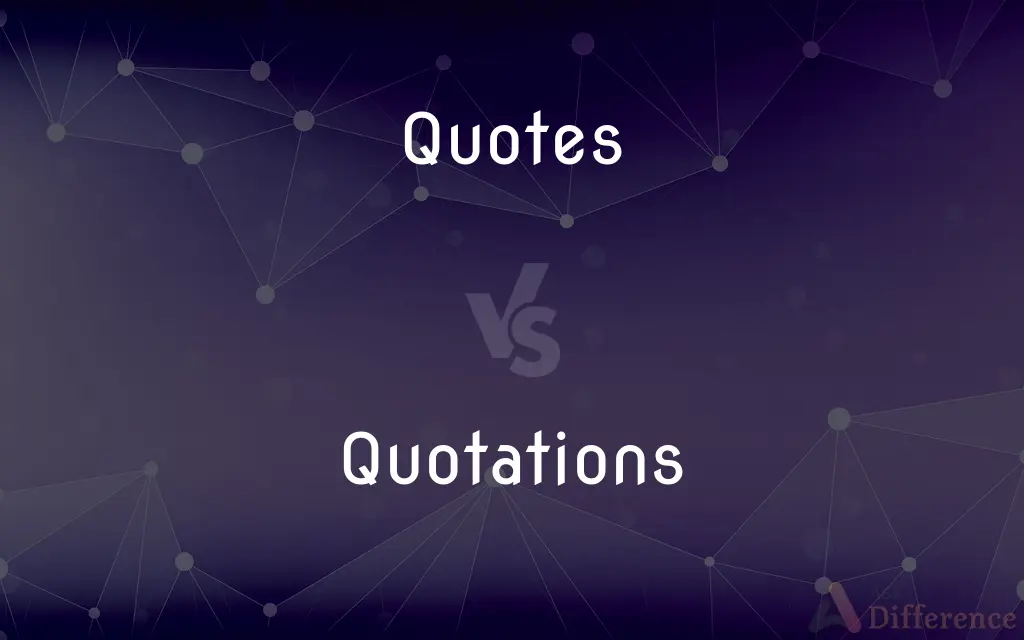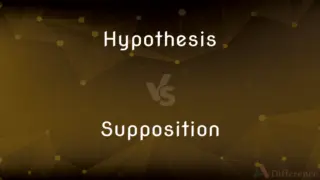Quotes vs. Quotations — What's the Difference?
By Tayyaba Rehman & Fiza Rafique — Published on February 3, 2024
Quotes are short excerpts from a larger text or speech, often used for emphasis or illustration. Quotations are the exact repetition of someone's words, usually cited in writing.

Difference Between Quotes and Quotations
Table of Contents
ADVERTISEMENT
Key Differences
Quotes are often used in both spoken and written language as a concise way to convey a point, idea, or sentiment, typically extracted from a longer piece of text or dialogue. Quotations, on the other hand, are a more formal representation of someone's exact words, often used in academic or professional writing. While quotes aim for brevity and impact, quotations emphasize accuracy and attribution.
In everyday language, quotes are commonly referred to as snippets of wisdom, humor, or insight, and are used informally. They can be paraphrased or adapted to fit the context. Quotations are more stringent in their use, requiring exact replication of the original words, including the speaker or author's tone and intent, often accompanied by a citation.
The use of quotes is prevalent in social media, where brevity is key, and the exact wording is less critical than the conveyed message. Quotations are more commonly found in scholarly articles, legal documents, and research papers where precision and sourcing are paramount.
In literature, quotes are often used to highlight a memorable line or a poignant statement that encapsulates a larger theme or idea of the work. Quotations, however, are used in academic writing to reference a specific source or to provide evidence for an argument or analysis.
Quotes are versatile and can be adapted or modified for various purposes like motivational speeches, casual conversations, or advertising. Quotations, in contrast, are bound by the ethical and academic standards of fidelity to the source and are used to support factual statements or arguments.
ADVERTISEMENT
Comparison Chart
Length
Often brief and succinct.
Usually longer, maintaining original length.
Formality
Used informally and conversationally.
More formal and used in academic or professional contexts.
Accuracy
Can be paraphrased or adapted.
Require exact replication of the original words.
Usage
Common in social media, speeches, and casual conversation.
Predominant in scholarly work, legal documents, and research.
Purpose
To convey an idea or sentiment effectively.
To provide precise evidence or support for a claim.
Compare with Definitions
Quotes
A brief excerpt from a larger work for emphasis.
To be or not to be, is one of Shakespeare's most famous quotes.
Quotations
An exact repetition of words for accuracy and authenticity.
The article began with a quotation from the President's inaugural speech.
Quotes
A memorable or catchy phrase used in everyday conversation.
Just do it became a popular quote inspiring action.
Quotations
A precise replication of someone's words.
In her essay, she used the quotation, I have a dream, from Martin Luther King Jr.
Quotes
An impactful or thought-provoking statement.
The quote, knowledge is power, underscores the value of education.
Quotations
A documented reference to support factual statements.
She used a quotation from a scientific study to back her hypothesis.
Quotes
A paraphrased or adapted line that captures the essence of an idea.
Her quote, teamwork makes the dream work, emphasized collaboration.
Quotations
A cited excerpt from a text used in academic writing.
His research paper included a quotation from Darwin's 'On the Origin of Species'.
Quotes
A line used to summarize or highlight a concept or opinion.
His quote, less is more, succinctly expressed his minimalist philosophy.
Quotations
A segment of speech or writing used as evidence in arguments.
The lawyer presented a quotation from the witness's testimony for the case.
Quotes
To repeat or copy (words from a source such as a book), usually with acknowledgment of the source
Quoted lines from Shakespeare in his lecture.
Quotations
The act of quoting.
Quotes
To repeat or copy the words of (a person or a book or other source)
Likes to quote Shakespeare when giving advice.
Quotations
A passage quoted.
Quotes
To cite or refer to for illustration or proof
Quoted statistics to show she was right.
Quotations
An explicit reference or allusion in an artistic work to a passage or element from another, usually well-known work
"Direct quotations from other paintings are fairly sparse" (Robert Hughes).
Quotes
To repeat a brief passage or excerpt from
The saxophonist quoted a Duke Ellington melody in his solo.
Quotations
The quoting of current prices and bids for securities and goods.
Quotes
To state (a price) for securities, goods, or services.
Quotations
The prices or bids cited.
Quotes
To give a quotation, as from a book.
Quotations
Plural of quotation
Quotes
A quotation.
Quotes
A quotation mark.
Quotes
Used by a speaker to indicate the beginning of a direct quotation
"He paused and said, quote, I don't care, unquote.".
Quotes
A dictum; a saying.
Quotes
Plural of quote
Quotes
Quotation marks.
Put his statement in quotes.
Common Curiosities
What is a quote?
A quote is a brief excerpt from a larger text or speech, often used for emphasis or illustration.
Are quotes informal?
Quotes are often used informally and can be adapted to fit conversational or casual contexts.
Can quotes be paraphrased?
Yes, quotes can be paraphrased or adapted for different contexts.
Are citations necessary for quotations?
Yes, citations are necessary for quotations to attribute the original source.
Can quotes be used in academic writing?
Quotes can be used in academic writing but are often paraphrased or summarized.
Can quotes be humorous or inspirational?
Yes, quotes are often used for humor or inspiration, especially in speeches or social media.
Are quotations more formal?
Quotations are more formal and are often used in academic or professional writing.
Do quotes need citations?
Quotes do not always require citations, especially in informal use.
Should quotations maintain the original tone?
Yes, quotations should maintain the original tone and context of the source.
Must quotations be exact?
Yes, quotations must be the exact words as originally spoken or written.
What is a quotation?
A quotation is the exact repetition of someone's words, typically used in writing with a citation.
Is accuracy crucial for quotations?
Yes, accuracy is crucial for quotations to maintain the integrity of the original source.
Are quotes commonly used in everyday language?
Yes, quotes are commonly used in everyday language and popular culture.
Can quotes be a part of dialogue?
Yes, quotes can be part of a dialogue, representing a character's speech or thoughts.
Do quotations require understanding of the original context?
Yes, understanding the original context is important when using quotations to ensure accurate representation.
Share Your Discovery

Previous Comparison
DSP vs. Microprocessor
Next Comparison
Hypothesis vs. SuppositionAuthor Spotlight
Written by
Tayyaba RehmanTayyaba Rehman is a distinguished writer, currently serving as a primary contributor to askdifference.com. As a researcher in semantics and etymology, Tayyaba's passion for the complexity of languages and their distinctions has found a perfect home on the platform. Tayyaba delves into the intricacies of language, distinguishing between commonly confused words and phrases, thereby providing clarity for readers worldwide.
Co-written by
Fiza RafiqueFiza Rafique is a skilled content writer at AskDifference.com, where she meticulously refines and enhances written pieces. Drawing from her vast editorial expertise, Fiza ensures clarity, accuracy, and precision in every article. Passionate about language, she continually seeks to elevate the quality of content for readers worldwide.














































